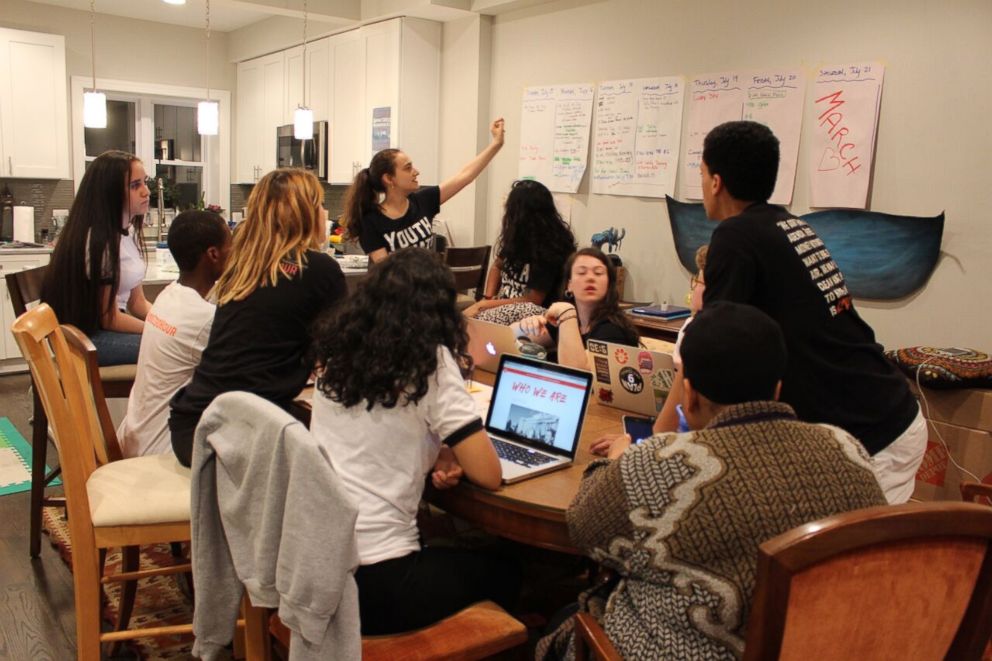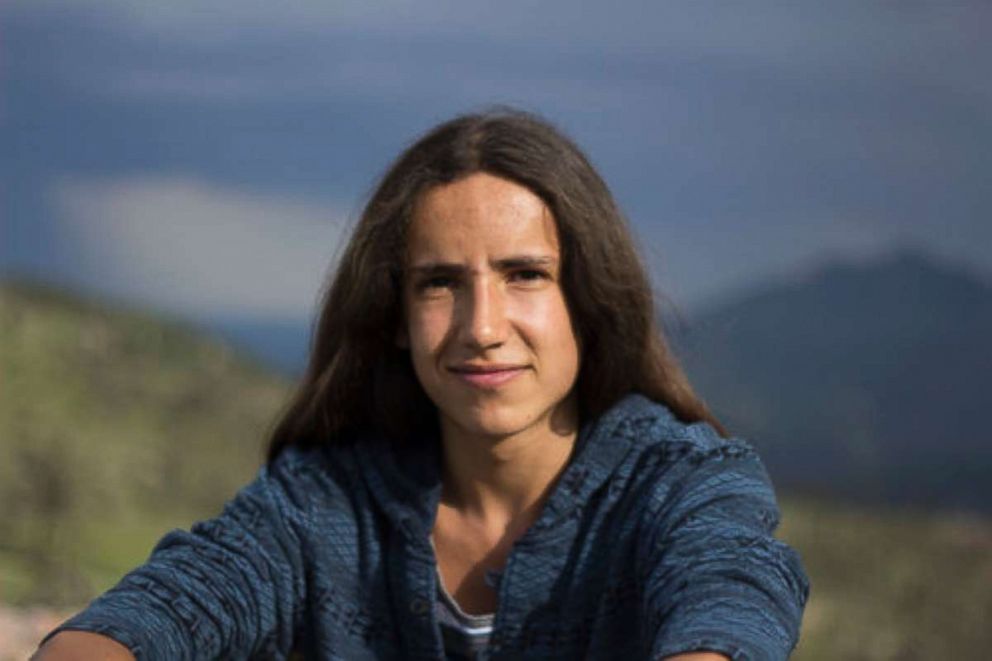18 for 18: Young people use their vote to call for change on climate policy
First-time voters consider climate change when deciding how they'll vote in 2018
The four students were from all different parts of the country when the met at a summer program at Princeton University last summer.
One of the students, 16-year-old Jamie Margolin, brought them together with their common interest in climate change. Now the group is working to inspire more young people with that activism and spur action ahead of the 2018 midterm elections.
They kept in touch and their effort became "This is Zero Hour," a youth climate change movement which will hold marches in Washington, D.C. and several other cities around the country this weekend. One of the founding members, 18-year-old Zanagee Artis from Connecticut, said he's one of the few members that will be old enough to vote this year.
Artis said the fact that the march is almost entirely led by young people is powerful and they hope it inspires more young people to get involved with the issue going forward.
"I think it was really important for us to have it youth-led, our generation will be the generation that grows up with the climate crisis so whatever happens it's gonna be on us to fix it. If we don't we're not going to survive," he told ABC News.

Young people between 18 and 35 are more likely to say that global temperatures are rising and that the government should take action, according to a new ABC News/Stanford University Poll, and many of those young people are set to make their opinions heard at marches around the country this weekend and in the 2018 midterm election.
A poll from ABC News, Stanford University and Resources for the Future released this week found that more young people say temperatures have risen around the globe than other generations and that more young people say that the government should take action on climate change.
The majority of people age 18 to 39 surveyed from May 11 to June 7 of this year said they support substantial government action on global warming, compared to just 54 percent for those 50 or older. Young people are also more likely to say there are serious risks to the U.S. if the government does not take action, 61 percent compared to 44 percent for the older age group.
The "This is Zero Hour" campaign has released a platform with a detailed list of demands for politicians, including that they reject money from the fossil fuel industry and support strong, climate-oriented policies like eliminating fossil fuel subsidies and rejoining the Paris climate agreement.
The marchers in Washington, D.C. is also holding a lobbying day for participants to meet with lawmakers, but organizers say the real measure of success will be translating the march into future momentum for climate issues.
Artis said the climate is seen as especially pressing for young people because they are going to see the impact of climate change in their lifetime. He said that voting is not the group's only way to impact policy and they are also encouraging young people to talk with lawmakers and connect with other people passionate about the issue.
"For us, it's not just about trying to do positive things for the environment, it's also about having to save ourselves," Artis said.
ABC News spoke to a few of the young people who have made their mark with climate change activism about how the issue will affect their vote this November.
The third-generation activist

Xiuhtexcatl Martinez is one of the plaintiffs in a lawsuit filed by a group of young people against the government for its lack of action on climate change. All of the plaintiffs in the case, Juliana v. United States, are between the ages of 10 and 21.
A federal judge ruled that lawsuit can move forward on Friday, despite the administration's request that it be dismissed.
Martinez recently turned 18 and said he plans to work with community groups ahead of the midterm election to look at whether local politicians or on the same wavelength as the community on environmental issues, including whether candidates accept money from fossil fuel industries.
He said young people today are politically more progressive, more inclusive, and the best equipped to address the climate crisis but they don't show up to vote.
"I'm incredibly excited to begin to use the power of my vote to elect the politicians in my community that are going to represent the voices of our people or our planet, and our future," Martinez said in a video on the website of the environmental organization he works with.
He said its especially to see candidates who say they stand for the environment take money from fossil fuel industries, which is one of the demands of politicians in the "This is Zero Hour" platform.
Martinez is the youth director for an environmental advocacy group called Earth Guardians and said its important for young people who want the government to address climate change to put forward their own candidates to represent their views and their communities, especially the latino and indigenous communities.
"Ever since I was really little I viewed my sense, my place in this world, just really looking at myself and my life as having the potential to do something bigger," he told ABC.
Martinez's passion for climate change as an issue runs in the family, his parents are both environmental activists and his mother founded the Earth Guardians organization, which began as a school in Hawaii in 1993. He has spoken at conferences around the world from a young age, including speaking at national events starting when he was 6 years old. He has also lobbied against fracking and for more environmental policies in his hometown, Boulder, Colorado.
He said he's thinking of running for office before he turns 20, "even if it's just to make a statement," he said, but he's also supporting his friend Jackson Hinkle who just turned 18 and is running for city council in San Clemente, California.
The amateur climatologist
Egdar McGregor, 18, lives in Southern California. He said he's always been interested in the weather and how it changes.
He told ABC News he started charting National Weather Service data, on his own, and saw how the graphs have changed over the last 100 years. McGregor said it scared him when he saw some of the trends and he became more interested in climate change instead of just the weather.
"When I look to see what the forecast is over the next 100 years the warming accelerates California can’t live like this, we can’t continue to be one of the most agriculturally important states," McGregor told ABC News.
McGregor said he gets frustrated that his peers don't seem to notice climate change and that he wants his teammates on the speech and debate team to use their skills to speak out.
In 2017, when he was 17, he wrote an essay calling for action on climate change and to leave a better world for his generation and the next one.
"We kids are the future, and we will live in the world that you have left us," he wrote. "We are the children Carl Sagan asked you to leave a better Earth for, and to us, it seems as if you have not done so. We cannot wait any longer to solve climate change. Now, it is our turn to save this disaster."
McGregor is speaking at the This is Zero Hour march in Los Angeles this weekend.
The changemaker
Therese Etoka has lobbied the Idaho state government to include climate change in the state's high school science curriculum and worked to push her hometown, Boise, to transition to renewable energy sources. She told ABC News she helped collect more than 1,000 postcards from students in support of the renewable energy campaign in her city.
Etoka, who was born in the Democratic Republic of Congo, testified at state hearings urging the legislature to adopt better high school science standards that included educating students on global warming and climate change.
After she was asked by the committee chairwoman not to discuss climate change in her testimony, Etoka told a local paper that she made a point to attend the next day of the hearing to show the committee she wasn't afraid.
Etoka said she is working with a candidate for state superintendent, Cindy Wilson, and has volunteered for other Democratic candidates. She said a lot of students in the state want something new and that young people that have the power to vote should get involved to support candidates that represent their views and want to help the environment.
"This is our future and this is our planet already and what we do now is really going to affect the next year, " she told ABC News.
In addition to working with the Climate Justice League, an affiliate of the Sierra Club chapter, Etoka works with refugee families through her high school's humanitarian club. Etoka is attending Connecticut College in the fall to study international relations, with an emphasis in political science and French.




